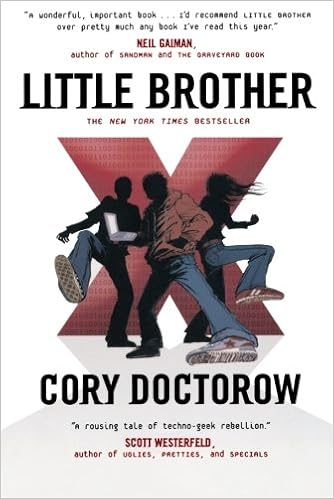I think one of the most valuable things that literature does, is present facets of reality in a way that frees the mind to really think about them. When we look at what is going on in the world, our perception is loaded down with masses of expectation, preconception, fear, and denial: "That could never happen to us." When we read fiction, we can look at a model of some of those real-world situations, without our reality-baggage weighing us down. Only after the reading, does it sometimes become clear the connection between the fiction and the reality. That's the power of some of the really great pieces of literature such as George Orwell's 1984 which was an illustrated caution of what happens when the government watches the people instead of the people watching the government.
 In 1948 the post WWII British government was scrutinizing its populace in a way that was impossible in previous eras. Orwell, always deeply suspicious of government, wrote 1984 as a response and it struck a chord. It was, and is, chilling just how predictive it ended up being. 'Orwellian' became a common term for justified paranoia about government scrutiny. For a time, people talked about the relationship between language and thought patterns ("newspeak") and dogmatic conditioned response ("5 minute hate.") These things were chilling because elements already existed in the world in the less extreme forms of propaganda. It provided access to a necessary conversation about the role of the governed in the government.
In 1948 the post WWII British government was scrutinizing its populace in a way that was impossible in previous eras. Orwell, always deeply suspicious of government, wrote 1984 as a response and it struck a chord. It was, and is, chilling just how predictive it ended up being. 'Orwellian' became a common term for justified paranoia about government scrutiny. For a time, people talked about the relationship between language and thought patterns ("newspeak") and dogmatic conditioned response ("5 minute hate.") These things were chilling because elements already existed in the world in the less extreme forms of propaganda. It provided access to a necessary conversation about the role of the governed in the government.But, we forget these lessons or we need to rephrase them for new generations. Little Brother is a direct inheritor of Orwell's 1984.
Marcus is a pretty typical High School student in San Francisco. He's savvy to network security and can get around most things if he really wants to. He plays games online, doesn't watch broadcast TV, and get's most of his information from the internet. So, yeah pretty much the kids I teach, day to day.
Things change for Marcus when terrorists bomb the Bay Bridge. The Department of Homeland Security cruises in and takes control. Unfortunately for Marcus, he gets picked up off the street and detained without due process in a secret facility where he's questioned for days. Eventually he is released, but he San Francisco he is returned to is under the scrutiny of the DHS. Ordinary people are scrutinized and the city under martial law is a dark place.
Marcus fights back, the only way he can.
What I liked about Little Brother is how well Doctorow updates the ideas of 1984. While the actual plot is very different, so is the world. Out and out war is no longer the bogeyman, terrorist attack is. Much like Orwell, Doctorow is pointing out that a populace that is afraid will, on the whole, give up their rights for the promise of security. Additionally, the digital revolution has changed the world. Most of the time we are giving up freedoms mainly because we are ignorant of how the internet really works. The potential for abuse is astounding.
Little Brother asks us some very relevant questions and challenges us to think about how the internet really works. I have to admit, while I would rate myself as above average in technical savvy, I know that I am still woefully ignorant. What terrifies me is that I know I have a better understanding than many of the legislators making decisions and setting policy.
It's something to think on.
No comments:
Post a Comment